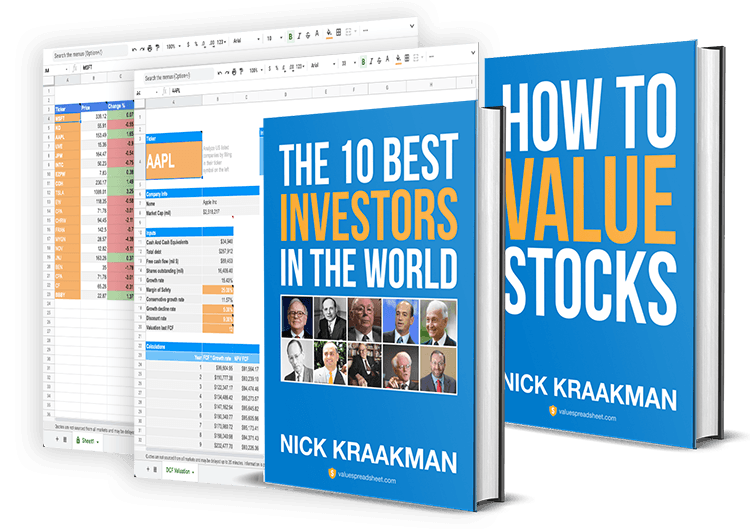Transcript
Hello, welcome back to the Value Investing Bootcamp podcast.
This is episode six already.
I'm your host, Nick Kraakman, and I want to thank you so much again, as always, for tuning in, and I hope I can provide you some useful information again today to help you earn those above average returns that everyone is longing for.
So, today, what we'll cover is something which is, for me personally, a very important topic, because I see so many people go wrong here, and I hear so many, well, wrong stories around this topic.
The topic we're talking about is risk.
Risk is something that is inherent to the stock market.
I mean, some people compare it to gambling.
I completely disagree with that comparison, because as long as you're investing based on solid fundamentals, and purchasing only good companies at a really discounted price, at a bargain price, it is not gambling anymore.
Gambling is just throwing your money at something and then hoping you'll get more out of it.
Value investing is really shifting the odds in your favor significantly so that there's hardly any way for you to lose money.
I mean, think about it: if you can buy something which increases in value over time, you can purchase it for half the price, yeah, your investment becomes worth more and more over time, and eventually the price you'll be able to get for your investment will catch up with that increasing value.
It's almost as if you're pushing a ball under water, you know.
The harder you push the ball under the water, the more pressure will build up underneath the ball to push it up out of the water, and it's similar way to investing.
The lower the purchase price or the higher the value rises, the higher the pressure will become, and eventually the ball will pop up, the stock price will pop up again, and you'll earn a handsome profit.
What financial studies and colleges and business schools, whatever, what they're teaching is that risk and reward are highly correlated.
If you want to earn more money, you need to take more risks.
This is absolutely wrong, at least when it comes to value investing.
I mean, with gambling, sure, it is the case that if you want to increase your possible returns, you have to take more risks, your odds of winning will become smaller, but your potential profit becomes higher.
This is not the case with investing.
When you lower your risk, you actually have more upside potential, so the sword cuts on both sides, so to say.
You get the best of both worlds.
The problem is that many investors don't have the right definition of risk in their minds.
They don't really know what risk really is.
When they see price fluctuations, for example, a stock goes up 5% then drops 2%, it is a volatile stock, they consider it risky, but price movements on their own say nothing about how well a company is actually performing.
A stock is something which gives you a piece of ownership of a company, so the ultimate price of a stock is related to the performance of the company.
However, many people seem to forget this.
They think that price movements on their own say something about the company, but prices can move very rapidly, while the company value only increases or decreases at a much lower rate.
For example, financial websites publish these numbers of like the five biggest gainers and biggest losers of the day.
Sometimes you see stocks that lose, their stock price drops 20% in one day.
Do you actually think that that company, that single day, lost 20% of its value?
No, the price of its stock declined 20%, because some news came out whatever, they're earning less money, people didn't expect that, so the price drops.
The problem is that this has been happening gradually over time, while this price movement, it's sudden.
So, what this says is that price and value are separate things.
If a price moves a certain amount of percentage points in a day, that says little about the actual value of the underlying company.
So, volatility in itself is not risk.
In fact, it offers opportunity, because if a stock is volatile, it's also volatile downward, so you can purchase stocks at lower prices than you normally could.
So, again, volatility is not risk, it offers opportunity, actually.
Other ways people define risk is beta, which is also related to volatility in a certain way.
Again, this is something that is completely irrelevant to value investors.
Another thing, people think that when something is uncertain, so if the future of a certain company is uncertain, for example, there's a lawsuit or there is whatever, their future earnings or will they be innovative in the future to earn a certain amount of money, it's uncertain, people consider this as risk as well.
The result of this is that companies with an uncertain outlook often get severely mispriced, undervalued.
Their price drops dramatically, because people don't like uncertainty at all, they like certainty.
So, uncertainty is actually the friend of the value investor, because it creates interesting prices, interesting buying opportunities.
So, what is risk, then if uncertainty or volatility or beta is not risk? What is risk?
Well, it is simply the probability and the amount of loss that you might incur, if you can calculate that.
It's always an estimate, you know.
You just have a feeling that there's a certain probability of you losing a maximum of let's say, 20% on this investment, then that is the risk.
However, it's your risk, it's your perceived risk.
There's no perfect measure for risk, it is all subjective, because we can never have perfect information.
We can minimize our exposure to risk by purchasing stocks at lower prices, because this minimizes the downside risk while maximizing the upside potential at the same time.
In other words, for value investing, the risk reward ratio is actually inversely correlated.
So, the less risk you take, the more upside potential you have.
That's the beauty of value investing.
So, embrace uncertainty, and profit from the prices it creates.
And yeah, this way you can-- Actually, uncertainty is your friend because it creates these amazing irrationally low prices, which allow you to purchase great stocks at a bargain price.
Okay, thanks again for listening.
Next episode will be about the psychology behind investing, and how your mind can sometimes prevent you from earning above average returns.
We'll go into that more in the next episode.
I'll see you there!
If you enjoyed today's show, head over to ValueInvestingBootcamp.com to find out more on how you can invest like the pros, manage your own portfolio with confidence, and consistently earn mind boggling returns on the stock market.



